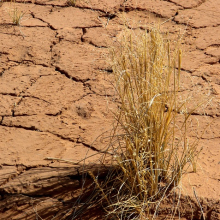
Natural disasters related to climate change have become more frequent and severe over the past three decades, causing damages to the agricultural sector and putting developing countries at risk of growing food insecurity, the UN has warned. Published ahead of the United Nations Climate Change Conference COP 21, which opens in Paris on Monday, a new study by the Food and Agriculture Organisation (FAO) sheds light on the impact of disasters on agriculture and food security. Between 2003 and 2013, droughts, floods, storms and other natural disasters caused worldwide damage worth $1.5 trillion. In developing countries, the agriculture sector bears much of the costs. “This year alone, small-scale farmers, fisherfolk, pastoralists and foresters – from Myanmar to Guatemala and from Vanuatu to Malawi – have seen their livelihoods eroded or erased by cyclones, droughts, floods and earthquakes,” said FAO Director-General José Graziano da Silva. Some 25% of the negative economic impacts hit the crop, livestock, fisheries and forestry sectors alone. In the case of drought, over 80% of the damage and losses affected the farming sector, particularly livestock and crop production. In Kenya, for example, drought between 2008 and 2011 caused significant losses in the food processing industry, especially grain milling and coffee and tea processing. In Asia, crop production losses caused by the 2010 floods in Pakistan directly affected cotton ginning, rice processing and flour and sugar milling, with the agricultural sector bearing half of the $10 billion in total damages and losses. Beyond production losses, the study shows how disasters can cause unemployment and erode incomes for small-scale family farmers, thus threatening rural livelihoods. The floods in Pakistan affected 4.5 million workers, most of them employed in agriculture, and almost 70% of farmers lost more than half of their expected income. These climate-related disasters are leading to increased food insecurity for many of the world’s most vulnerable people, hampering efforts to eradicate hunger and poverty. The FAO therefore calls for more investment in disaster response and in adaptation to climate change to make the farming sector more resilient. Although the livelihoods of 2.5 billion people worldwide depend on agriculture, only 4.2% of total official development assistance was spent on farming between 2003 and 2012, missing a UN target of spending 10% on agriculture. (ab)
